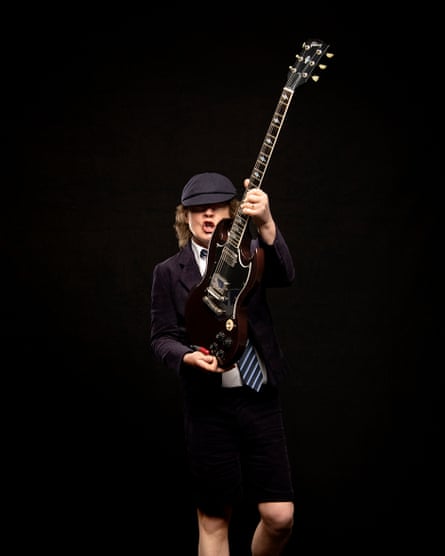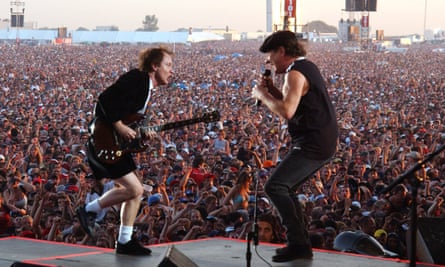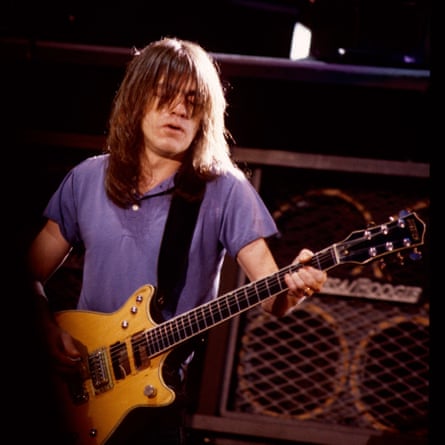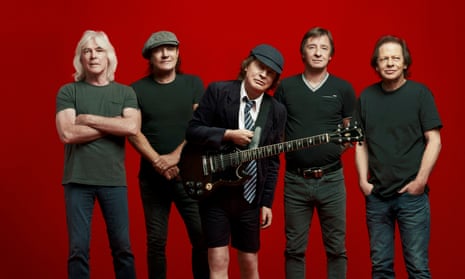At the end of an AC/DC show, Angus Young has a routine. After a couple of hours of perpetual motion in his schoolboy outfit, he heads straight for the shower and then, because he hasn’t been able to eat since noon – you can’t do an AC/DC show on a full stomach – he looks for food. “The first thing that enters my head is: I’m starving.”
When he left the stage of the Wells Fargo Center in Philadelphia on 20 September 2016 – the last night of the Rock or Bust tour – he might have been running through that routine for the last time in the band’s then 43-year history. The final 23 shows had been completed with Axl Rose as singer (brilliantly, it must be said), after hearing problems had forced Brian Johnson to retire from the road; he could no longer find his pitch onstage, and every show made his hearing worse. That summer, their bassist Cliff Williams had said he, too, would be leaving the band.
Drummer Phil Rudd, the longest-serving member bar Young, had not even made it on to the tour, after getting himself involved in what Young had called “a bit of a pickle”: pleading guilty in a New Zealand court to charges of threatening to kill his personal assistant, plus possession of methamphetamine and cannabis. Angus’s brother Malcolm – the band’s de facto leader – had already left, owing to dementia, to be replaced by their nephew Stevie. Little more than a year after that final show, Malcolm was dead.
So when, in September 2018, photos emerged of AC/DC – including Johnson, Williams and Rudd – together at a Vancouver studio, it seemed miraculous. Johnson, his hearing now much better thanks to what he calls a pair of “prosthetic eardrums”, agrees. “It just shows the resilience and the bond that exists between us. We walked into the studio, and you could feel the electricity in the air. And, of course, Malcolm was there. He was there in such a strong spirit that it was palpable. I think everybody could feel it.”
When Williams is asked if he had expected it to happen, his answer is rather more to the point. “No,” he says, simply, and bursts into laughter. But Young – since Malcolm’s retirement, the band’s undisputed kingpin – says he had always thought their story was not necessarily over. “I figured at some point either the record company or somebody would say to me: ‘Do you think you could put something together?’’ So I had that in the back of my head. But putting out newer material, I hadn’t really given that a thought.”
But here we are with Power Up, the band’s 17th studio album, and it is a good bit better than one might have feared. It would be unreasonable to expect another Powerage, Highway to Hell or Back in Black at this point, but Power Up is a genuinely decent album, a lot better than their last few. There are even surprises: Through the Mists of Time is curiously reminiscent of a mid-tempo track from an early REM album, albeit played by a hard rock band.
“I still get goosebumps when I hear that song,” Johnson says. “I can hear Malcolm through that song. It’s a throwback to the days when rock’n’roll was so much fun and we were younger and it just seemed like nothing would end and it was always gonna be life in the early 80s, before Aids, before all that. And when I listen to it, it’s almost like time travel.”
The origins of Power Up date back to the early years of this century. After the tour for Stiff Upper Lip ended in 2001, the band were silent for seven years, but Angus and Malcolm set to work on writing not just whole songs, but extra riffs, hooks and choruses. Young says they spent five years in the studio together accumulating material, with 2008’s Black Ice the first album made from those writing sessions.
Had Malcolm already been diagnosed with dementia? Were they stockpiling against the day when he wouldn’t be able to write? “There was the odd moment towards the end of that time … you could see something was not right. But he still held himself together pretty good,” says Young. “So for this album I was determined to use some of the strong ideas he had put a lot of effort into. I thought: ‘He knows me better than anyone,’ and he was my audience whenever I had my own ideas. And he used me as the same. Sometimes he might write something and he would go: ‘Is that too clever?’ And I would go: ‘No!’”
Young says he went into the studio to make Power Up with songs – all credited to Young and Young – pretty much complete, although Williams has a slightly different recollection: “Ang and Mal had a big pool of ideas for riffs and stuff that Angus pulls from. He identified 12 of them, and we worked them up in the studio.”
Johnson adds: “When we were in the studio, and I was trying out singing certain lines, it just kept flashing through my mind: ‘Is this how Malcolm wants this song?’ Malcolm was a strong character. He just commanded respect without even trying. And even though he’s not with us any more, it’s still there. We don’t want to sound gooey, but facts is facts.”

The appeal of AC/DC is not just in the riffs, the school uniform, the cannons, and the volume. It is also the sense of camaraderie they project. That is not to say they have all been best friends since the day they met (although Williams and Johnson are famously close), because the Young brothers were always spectacularly ruthless in their decisions about what was for the best. It is more that AC/DC represented a place – and their shows were that place – where the only thing that mattered was being among the likeminded and having a party.
The events of 2016 rather undercut that, especially in the notably terse statement announcing Johnson’s departure (since expunged from the internet). In its wake, one friend of Johnson’s told the press the singer felt “kicked to the kerb”, and many fans felt he had been hard done by.
“You can always in hindsight say it could have been done better,” Young admits. “But the situation was: what do we do in an emergency? I didn’t want to be sitting down with a bunch of legal people; that’s not my idea of a fun trip.”
Johnson himself issued a statement denying he had been sidelined, and now says he supported the band’s decision to carry on without him. “It’s this awful feeling where you’re letting the boys in the band down,” he says. “You’re letting yourself down, the punters down, and your confidence goes. And you can’t have that in a band like AC/DC; you’ve got to be front and centre, you can’t hide behind Angus all the time. Your body has let you down: it happens to footballers, to sportsmen. I wasn’t anything special. It was my turn and that was it.”
Then there was Williams going, which at the time he attributed to suffering from vertigo, rendering touring a nightmare, but which many fans believed to be a gesture of support for Johnson. Certainly, when I ask if he would have stayed had it not been for the turmoil, he doesn’t mention vertigo. “We started the Rock and Bust tour without Phil, and it went from there. So it was a slow process for me in my own mind thinking: this is it, I’m done.”

Curiously, though, the departure of Rudd – who I was not permitted to speak to – might have hit the hardest. No one else who has sat in the band has ever found the deep pockets of sound he finds for his drumming. As Johnson puts it: “When Cliff and Phil link up, I’m sorry mate, but it’s difficult to find anything like it.”
When reports of his crimes came through – including a charge of attempting to procure murder, which was withdrawn for lack of evidence – the band were shocked. “I was having a cup of coffee,” Johnson says. “And there was Phil on the screen, and I’m going: ‘What?’ Phil was in a bad place then. He was taking some bad cocktails [of drugs] or something.” Indeed, photos at the time of his arrest showed a man who looked completely hollowed out; he was eventually sentenced to eight months’ house arrest. “That’s not the Phil we know. Phil’s just the funniest, driest guy I know. I was just so sad. But thankfully now he’s as fit as a butcher’s dog,” says Johnson.
Rudd’s route back came via Malcom Young’s funeral in September 2017. “I had seen Phil at Mal’s funeral and he looked great,” Angus says. “He told me he’d been working with these rehab people, and he still has contact with the people who were helping him. I said: ‘As soon as I’ve got the material together, we’ll hook up.’”
One might imagine, though, that reassembling the band required the personal touch from Angus. One would be wrong. “Angus talked to the management and management got in touch with each one of us individually,” Johnson says. Young – speaking on a separate call from Johnson and Williams – frames it a little differently. “Brian got a hold of me and let me know that if I was going to be doing anything, he’d like to be involved.”
Once they reconvened, they say it fell into place quickly, though they would be unlikely to say anything else, given they are promoting what’s going to be one of the year’s biggest rock albums. “It was natural,” Williams says. “We’ve been together so long it was not an easing-in process or anything. We obviously had to scrape some moss off, but it came together pretty quickly.”
Angus Young probably could have made Power Up with Stevie Young plus a soundalike singer and a hired rhythm section. After all, the AC/DC brand has survived upheavals that would make most bands crumble, notably the death of Johnson’s predecessor, Bon Scott, in February 1980. And the 2016 shows with Axl Rose (and Chris Slade on drums) were truly fantastic. “We didn’t know Axl,” Williams says, “but he did a great job, got us through.” He says “it was a different vibe, completely”, but has “nothing but positives for Axl; he was very respectful, he worked hard, there was no bullshit.”
Rose did however start calling out for old, little-rehearsed songs, with barely any notice. “He would lay it on you just as you were going on: OK, we can do that,” Young says. “The guy who does my guitars had played some of those songs, and I said, ‘You shout out how I begin it, will you?’ I was praying that we got through it. As Axl says, he’d never rehearsed in his life.”

But for a new AC/DC album to be a real AC/DC album in the eyes of fans, it needed more connections to the band’s history than just Angus Young. Williams says that “if it wasn’t for Brian and Phil being there, I wouldn’t have been there. It’s as close to the band as we could get.” Does Young believe he could have called Power Up an AC/DC record without their presence? His answer goes back to Malcolm, reflects on the unique guitar sounds of Pete Townshend and Keith Richards, and has nothing to do with the question put to him. Which rather suggests he knows he had to have them on board, but that he doesn’t want to have to say so, because it is, after all, his band.
With the album done, they needed to work out one last thing: could Johnson still sing live? “We all gathered in Holland at a rehearsal place. We wanted battlefield conditions,” Johnson says. “So the boys put the whole backline up, and I put these prosthetic eardrum things in. It was just life changing. I could hear everything; I can’t tell you how good that feeling was.”
“So we did the first song, and he was thumbs up,” Young remembers. “He wanted to do more of it. That’s the most eager and excited I’ve seen him in years.”
Of course, the state of the world means he is going to have to wait a little longer. But one day, hopefully before very long, 11 o’clock at night will come, and a wrung-out Angus Young will leave a stage somewhere, clad only in his shorts, socks and shoes, hair plastered to his head. He’ll take a shower and wonder what he can get to eat.

Comments (…)
Sign in or create your Guardian account to join the discussion